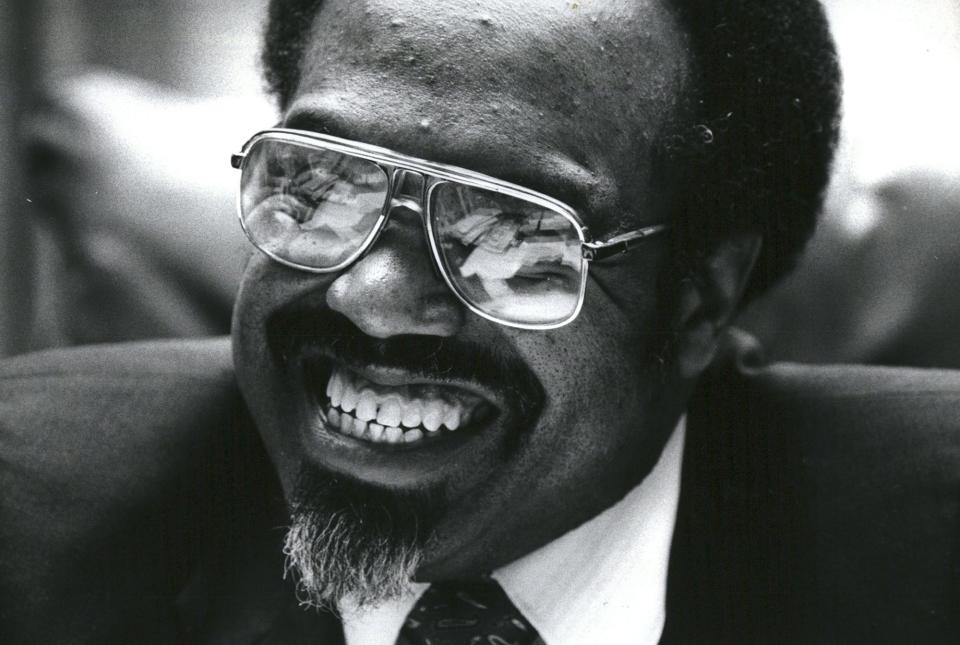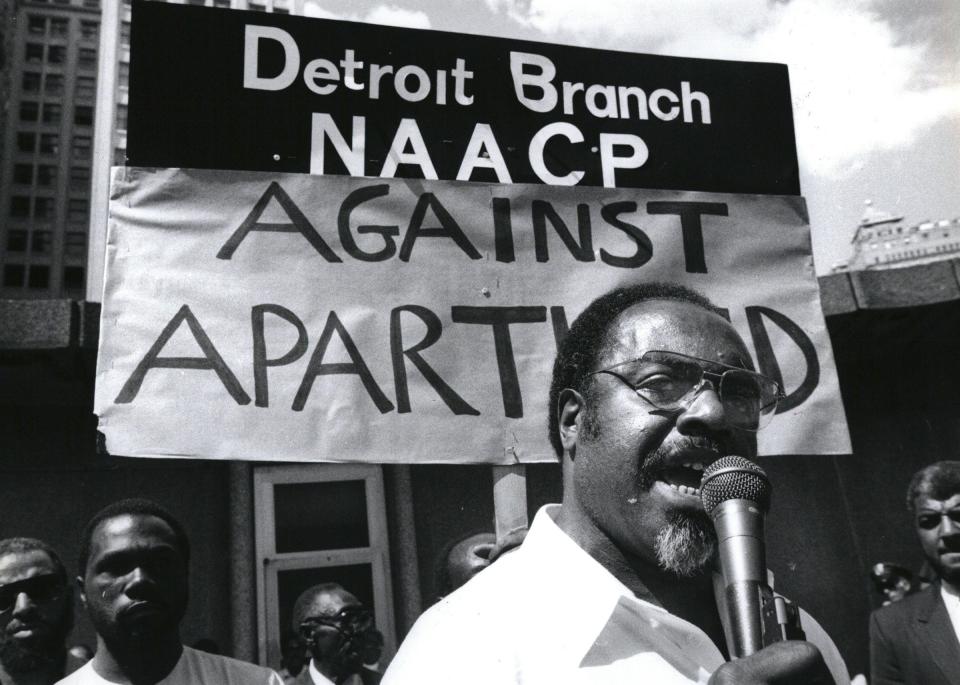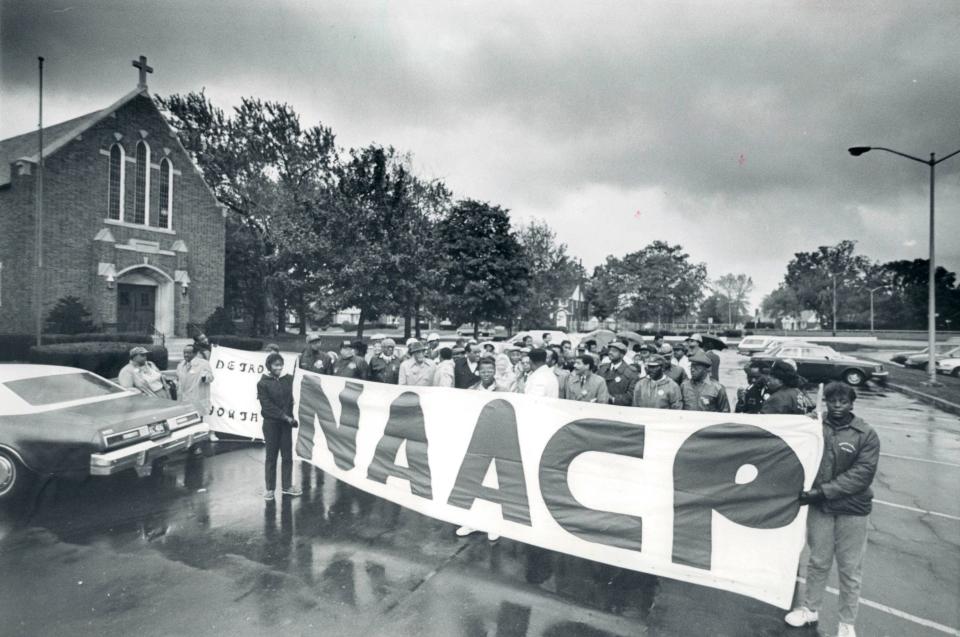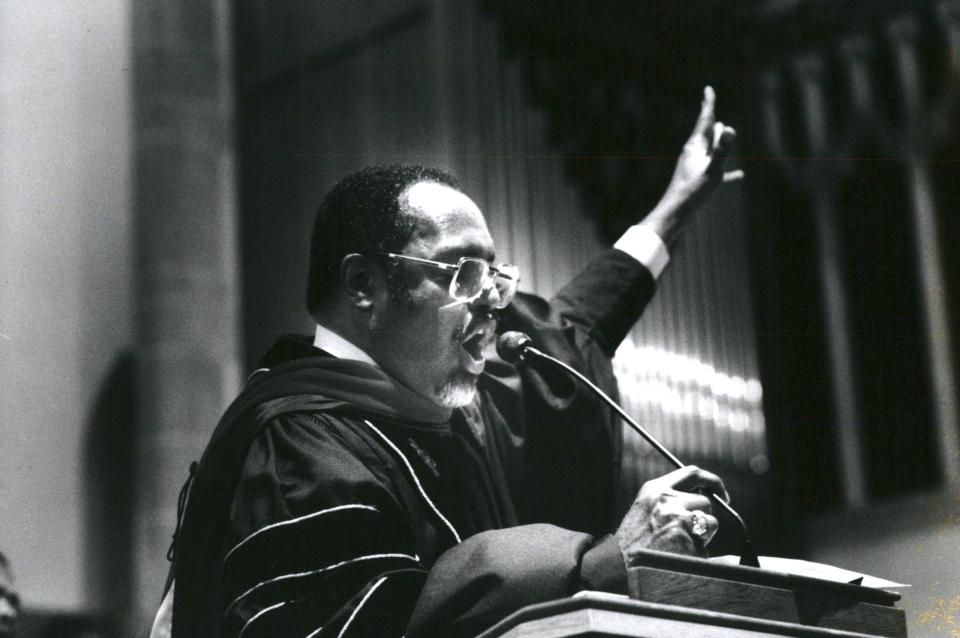Free Press Flashback: The Rev. Charles Adams' first days as president of NAACP in Detroit
- Oops!Something went wrong.Please try again later.
The Rev. Charles G. Adams, retired pastor of Detroit’s influential Hartford Memorial Baptist Church, died on Nov. 29 after a long illness. He was known as the Harvard Hooper, one of Black America’s greatest preachers. In 1984, Adams spoke with Ruth Seymour, religion writer for the Free Press at the time, shortly after he was elected president of the Detroit Branch NAACP. Seymour's article from that interview ran in the Free Press on Dec. 14, 1984, with the headline "A new voice for the NAACP." Special thanks to historian and journalist Ken Coleman for highlighting and sharing the piece in the days after Adams' death.
The first call came in June, another in July and a personal visit from an officer of the NAACP in October. Each time, the Rev. Charles G. Adams politely declined.
No, he said, he would not seek the presidency of the Detroit Branch NAACP, which, until last week, was held by retired Detroit schoolteacher Betty Lackey. No, he would not seek the vice-presidency either.
When a fourth caller rang on Oct. 29, the pastor of Hartford Memorial Baptist Church in Detroit tried to explain why his candidacy would be futile: He did not expect support from the organization's symbolic and traditionally moderate core.
He though people such as U.S. Federal Court Judge Damon Keith, the Rev. James Wadsworth, or former NAACP executive secretary Arthur Johnson, now of community relations at Wayne State University, would back the organizational status quo.
"I thought they would think I am too radical and loudmouth," explained Mr. Adams in a post-victory interview this week. Then he started chuckling, letting free a youthful grin.

Perhaps the good reverend was chuckling because he had been dead wrong. Those three community leaders and many others had lined up behind him in his bid.
Or perhaps he was chuckling because, as history would have it, it was precisely what he called the "radical and loudmouth" component of his ministry that put him over the top in last Sunday's election.
AS PASTOR of one of the city's largest and most influential congregations, Mr. Adams' renown as a mountain-moving speaker and thoughtful but energetic community activist drew frequent attention during the campaign.
His supporters said the local NAACP needed an articulate and visionary leader, because the nation's apparent swing to the political right threatens innumerable gains by Black Americans in recent decades.
Indeed, it was Mr. Adams who delivered the foot-stomping warm-up speech for Walter Mondale's October whistle-stop in Detroit. His gift with oratory is well-known; after his election as NAACP president, even former opponents praised him.

The Rev. Jim Holley of Little Rock Baptist Church had supported the campaign of Lackey, saying he preferred an NAACP president who is independent of church councils and city politics. But this week he said, "There is no doubt about it, he is a gifted individual. Charles will bring the ability to articulate the issues before the people."
Alvin Kushner, director of the Jewish Community Council of Metropolitan Detroit, said he was pleased with Mr. Adams' election: "He seems to have a very sharp mind. He speaks openly. And he knows the history of Black-Jewish relations; he doesn't have to learn it."
HONORING A LEGEND: Funeral services set for Rev. Charles G. Adams
FIRST ON Adams' drawing boards are plans for newly energetic teamwork between the NAACP and Detroit churches, as well as large-scale membership drives.
Mr. Adams, who also is an opinion page columnist for the Michigan Chronicle, envisions mass political forums on national and international issues of particular relevance to Black Americans, such as the ones held in Detroit during the 1940s and 1950s with Paul Robeson and Martin Luther King.
"Back in the '40s, the church was used to mobilize the masses," Mr. Adams said. "People were able to look at what was happening, and leave the meeting with marching orders. People are able to change things, if they are duly instructed and inspired."
With increased organized support from Black churches, Mr. Adams hopes, the resources will be available to bring in top-scale speakers.
"We need to hear from Bishop Tutu (the recent South African Nobel Peace Prize winner) what is going on in South Africa and what we can do about it and how it affects us," Mr. Adams said. "Jesse Jackson ― we need to hear his analysis of our situation.
"Walter Fauntroy (U.S. congressional representative from Washington, D.C., involved in the South African embassy protests) − why was he one of the first to go to jail and how did the South African embassy protests mushroom until they attracted the concern and commitment of whites and Jews and GOP senators?"
'Born to preach': Rev. Charles Adams was more than a pastor | Opinion
MR. ADAMS has vowed to increase NAACP membership, which in 1984 reached 19,252 in Detroit. He also envisions an NAACP effort to pressure government officials to slow drug traffic in the city.
"We are looking at the devastation of the inner city by crime and the underground capitalism of the narcotics industry," he said. "It has almost turned these areas into a tyranny. No one is able to come up with anything to do away with it . . . Everybody is scared.
The NAACP doesn't "have the resources, information or structure to fight it ourselves," he said. "But what we could do is bring pressure to bear. It would have to be a total governmental offense against the narcotics traffic, from the president on down."

The new NAACP president was born in Detroit, and spent much of his childhood across the street from the original Hartford Memorial Baptist Church at Hartford and Milford on the west side. His father was a red-cap in what is now the Amtrak station downtown, and his grandfather was a Baptist minister in South Carolina.
Mr. Adams has sometimes said his first call to the ministry came while he was still in the womb; he recalls for skeptical listeners his habit of practicing sermons at age four. "I would open a Bible, get behind a table and wail away," he said.
His intent never seemed to waver, through his days at Fanny Wingert Elementary, or his science-biology curriculum at Cass Tech. "I always wanted to be a minister I never had the desire to do anything other," he said. "But I wanted to bring to the ministry the kind of toughness of mind and thought that I thought science could provide."
Because his mother died when he was 13, he was raised primarily by his grandparents. His grandmother was the president of the Ladies Aid Society at Hartford Memorial.
Mr. Adams recalls spending a lot of time with the family of Hartford's pastor, the Rev. Charles A. Hill Sr., who in the '40s served as president of the Detroit branch of the NAACP. (The Detroit branch was founded in 1910.)
"He was called militant and radical, just because he had Paul Robeson in to give concerts in the '40s and '50s," Mr. Adams said. "During the McCarthy era, FBI agents used to surround the church when Robeson was there and take down everybody's license plates."
Again came the chuckle. "We did not have a car, so they did not have to take down our license plates," he said. "My family had no money."
MUCH OF Mr. Adams' ministerial style came from the activist ministry of that early mentor, Mr. Hill.
Recalls Detroit City Council President Erma Henderson, an acquaintance of Mr. Hill: "My impression of (Charles Adams) was formed rather early because of his association with the late Rev. Charles A. Hill, one of the moving folks in the '40s as president of the NAACP. Rev. Hill was one of the first Black members of our community who ran for city council.
"The then-young Charles Adams was a member of his church. He grew up there, and when Hill passed away Rev. Adams assumed the pastorage. He became much like Rev. Hill in hisardent request for justice and equality. That was when I had gained the impression he had absorbed the philosophy of Hill, and would follow in his footsteps."
Mr. Adams attended Fisk University, Nashville, Tenn., on a scholarship, left after two years to care for his ailing grandmother, and graduated from the University of Michigan in 1958 with a degree in history. He served as a ministerial intern at Morehouse College in Atlanta and graduated from Harvard University School of Divinity in 1964.
He served for five years as a pastor of a large congregation in Boston, leading marches for integration with the Boston chapter of the NAACP. In 1968, he accompanied students staging a sit-in at Brandeis University for more Black tenured faculty and black historystudies.
In 1969, the congregation of Hartford Memorial asked him to return, and he accepted.

Under Mr. Adams' 15-year pastorship, the church has created a free medical clinic, free clothing mission, free legal consultation clinic, 24-hour crisis phone counseling, print shop training and school, a low-cost auto-repair clinic, and a food co-op.
The church basement hosts a slew of educational efforts, including student tutorial for all grades, a program for high-school students, GED extension classes, and college extension classes ― reflections of Mr. Adams' own passion for education.
"Thomas Jefferson was right," he said. "An unenlightened electorate will tolerate the steady erosion of the civil liberties upon which this nation was founded. In order to protect our democracy, we are going to have to promote and foster the education of the masses."
This article originally appeared on Detroit Free Press: Rev. Charles' Adams first days as president of NAACP in Detroit

